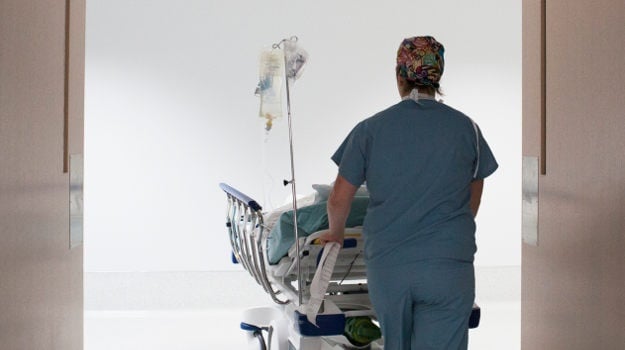


A nurse pushes a patient into surgery.
- Netcare, Life Healthcare and Mediclinic have had to shift their focus to dealing with the pandemic while their regular patients choose to stay away
- But elective surgeries are where hospitals make a large portion of their profits.
- Listed hospital groups have had a tough run in the past few years from a low-growth economy.
With South Africa’s biggest private hospital gearing themselves up for the war against Covid-19 pandemic in partnership with government for a peak that is still some weeks away, their balance sheets are going to have to prove resilient.
As the infection rate continues to climb and gets closer to the 200 000 mark, Netcare, Life Healthcare and Mediclinic have had to shift their focus to dealing with the pandemic while their regular patients choose to stay away.
More lucrative elective surgeries such as cataract removal and hip replacements are also being put off. At first this was not too much of an issue, since private hospitals expected to make up for those numbers when the threat of Covid-19 dissipated. But it’s clear that this could take time as the lockdown stretches to four months.
“Elective procedures are where they (hospitals) really make their profits,” Gryphon Asset Management portfolio manager, Casparus Treurnicht, said.
“Let’s say the virus is only eliminated in June 2021, we could see rights issues. But that is a very negative scenario.”
“A slight positive is the state having some sort of agreement with the private sector to take up pay for state patients – however this will cause receivables to increase and do not be surprised if there are payment problems in the future,” he said.
Tough run
The pandemic deepens a winter for the listed hospital groups that have had a tough run in the past few years from a low-growth economy with insured lives stagnant at almost nine million and challenges in its overseas businesses.
Shares in Netcare are some 62% lower over the past five years, while Life Healthcare is trading 49% lower. Mediclinic has slumped 70% since February 2016.
- READ | How the coronavirus turned a taxi business into an ambulance
Victor Mupunga, a research analyst at Old Mutual Wealth Private Client Securities, said elective procedures should pick up when Covid-19 eases and there will be pent-up demand.
With regards to what the next few months will look like for the groups, Mupunga said despite having the strongest balance sheet before the pandemic, Netcare will feel the impact of the weakened economy more than its competitors, since it only operates in South Africa.
Netcare exited its UK business in January and is now solely focused on South Africa.
March proved to be a difficult time for the company because of a decrease in patient numbers because of the pandemic. Netcare lost about R143 million in revenue in that month alone.
Jacques du Plessis, MD of Netcare’s hospital division, said the group has had increase in Covid-19 admissions and it currently has capacity to provide care for them.
To further prepare to meet the demand for Covid-19 related hospitalisation, he said the company was focusing on managing its resources effectively.
“Should a situation present where one of our hospitals do not have capacity at a given time, patients will be transported to and accommodated in another of our hospitals which does have capacity.”
Netcare has 55 hospitals and about 10 000 beds in the country.
- READ | Amid panic buying of medicines in South Africa, Aspen is ramping up production
Life Healthcare, which has 66 hospitals and 9 000 beds, has also felt the impact of Covid-19 and has seen its southern Africa hospital admissions fall by almost 40% from mid-March to the end of April.
The group estimates that its earnings had declined by R67 million due to the pandemic.
Mediclinic has seen a sudden drop in patients in its southern Africa, Middle East and Switzerland facilities in March, which is usually its busiest month. The group owns 76 hospitals in South Africa and 11 600 beds.
Dr Stefan Smuts, chief clinical officer of Mediclinic Southern Africa, said after the level five lockdown in March, the group had started having elective surgeries in hospitals that have capacity and a low Covid-19 prevalence.
“The surgical cases are, however, lower than pre-Covid-19 levels. Medical cases have also declined and have not recovered to historical levels. We believe this is mainly due to people avoiding seeking healthcare.”
He added that the group postponed its capital investment projects to allow for better cash flow and is re-prioritising all its projects to manage the pandemic.
Asief Mohamed, founder and chief investment officer at Aeon Investment Management, said hospitals may have to cut costs to mitigate the impact of the pandemic, which they could not have been prepared for.
However, it is unclear where all the cost-cutting can happen and retrenchments may not be an option since the hospitals need their staff for the pandemic, particularly nurses.

